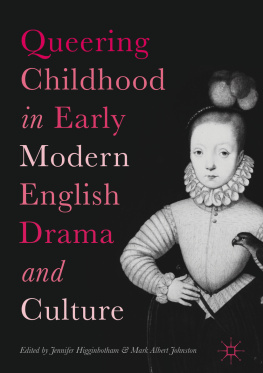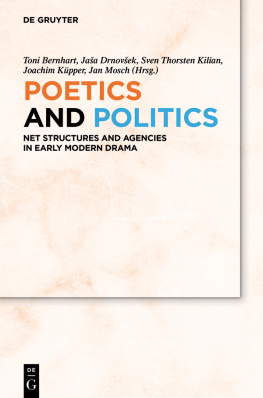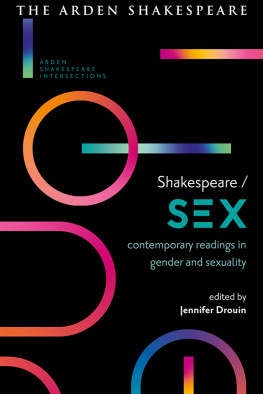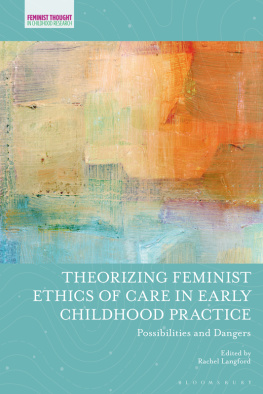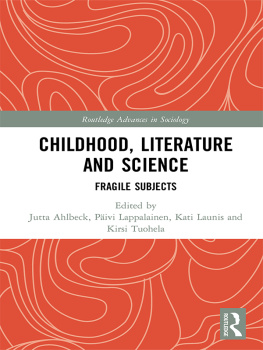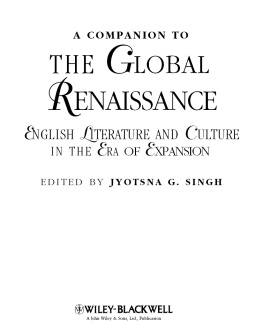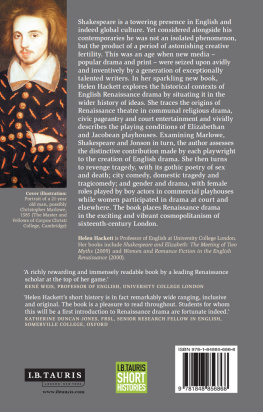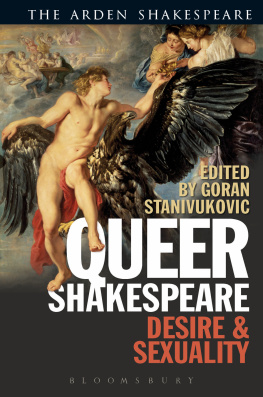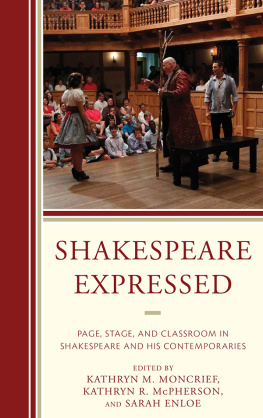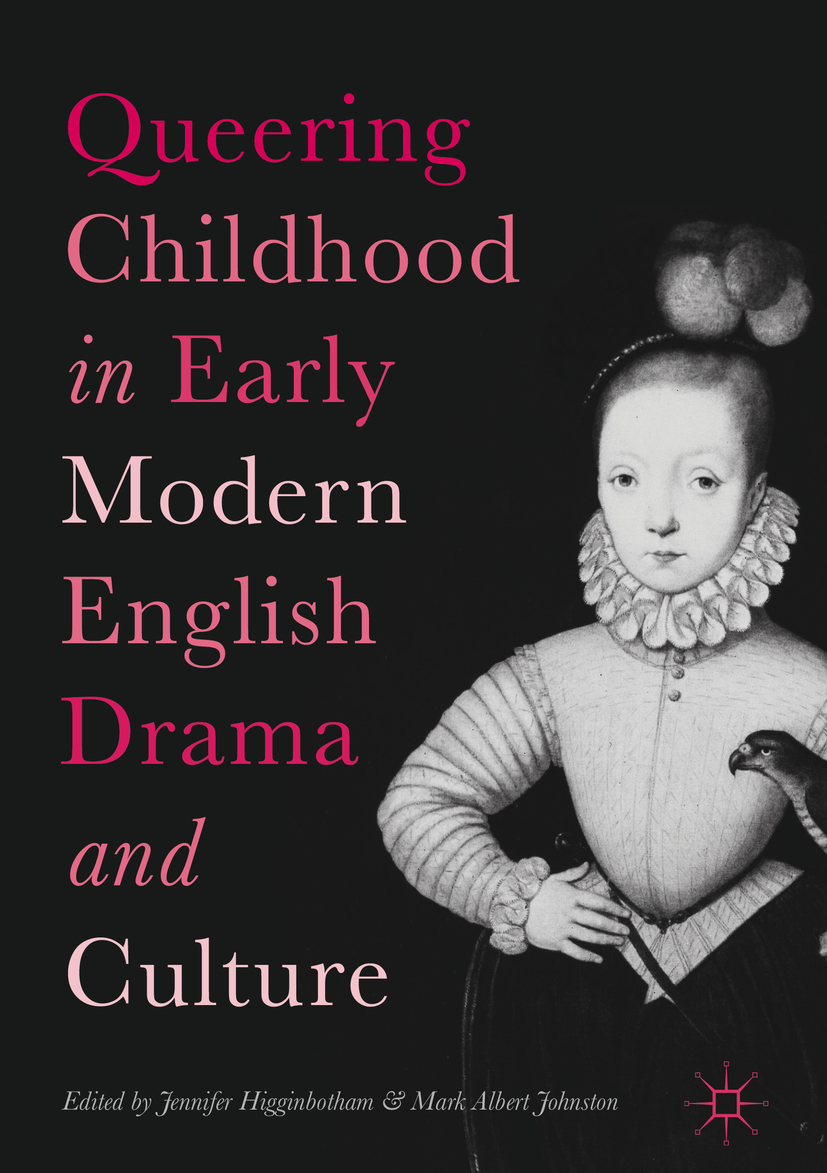Editors
Jennifer Higginbotham and Mark Albert Johnston
Queering Childhood in Early Modern English Drama and Culture
Editors
Jennifer Higginbotham
Ohio State University, Columbus, OH, USA
Mark Albert Johnston
University of Windsor, Windsor, ON, Canada
ISBN 978-3-319-72768-4 e-ISBN 978-3-319-72769-1
https://doi.org/10.1007/978-3-319-72769-1
Library of Congress Control Number: 2018936661
The Editor(s) (if applicable) and The Author(s) 2018
This work is subject to copyright. All rights are solely and exclusively licensed by the Publisher, whether the whole or part of the material is concerned, specifically the rights of translation, reprinting, reuse of illustrations, recitation, broadcasting, reproduction on microfilms or in any other physical way, and transmission or information storage and retrieval, electronic adaptation, computer software, or by similar or dissimilar methodology now known or hereafter developed.
The use of general descriptive names, registered names, trademarks, service marks, etc. in this publication does not imply, even in the absence of a specific statement, that such names are exempt from the relevant protective laws and regulations and therefore free for general use.
The publisher, the authors and the editors are safe to assume that the advice and information in this book are believed to be true and accurate at the date of publication. Neither the publisher nor the authors or the editors give a warranty, express or implied, with respect to the material contained herein or for any errors or omissions that may have been made. The publisher remains neutral with regard to jurisdictional claims in published maps and institutional affiliations.
Cover illustration: Granger Historical Picture Archive / Alamy Stock Photo
This Palgrave Macmillan imprint is published by the registered company Springer International Publishing AG part of Springer Nature.
The registered company address is: Gewerbestrasse 11, 6330 Cham, Switzerland
Advocating a radical unknowing regarding the early modern child and childhood, this fascinating collection challenges even as it extends queer theoretical paradigms. From the role of race in reproductive futurity to asexuality as a queer orientation, the energy and variety of these essays move the question of queering beyond the erotic appeal of children and their purported innocence toward the knowledge relations they were conscripted to perform.
Valerie Traub, Adrienne Rich Distinguished University Professor of English and Womens Studies, University of Michigan
A historically complex account of queer childhoods. The essays in this fascinating volume are attuned to the historically variable forms of desire between adults and children and they force us to reckon with the contingency of our own sexual moralities. Confronting head on the meaning and validity of a range of erotic encounters between all kinds of bodies, young and old, the scholars gathered here exercise a mode of radical unknowing in order to leave open the meaning of the erotic systems they find in a wide range of texts from the early modern period. Essential reading in queer theory and beyond!
Jack Halberstam, Professor of English and Gender Studies, Columbia University, Author of The Queer Art of Failure and Female Masculinity
In this current climate in which pseudo-scientific claims about childhood are regularly made in the names of cognitivism and neuroscience, it is all the more important and salutary to be able to welcome this volume that engages seriously with childhood as a culturally and historically contingent identity. It will be of great interest to Early Modernist scholarship but also much more widely in showing how childhood crucially inflects issues of history and identity.
Karn Lesnik-Oberstein, Professor of Critical Theory, Director of the Graduate Centre for International Research in Childhood: Literature, Culture, Media, University of Reading, UK
This collection of essays co-edited by Jennifer Higginbotham and Mark Albert Johnston extends the insights of queer theory to the study of children in the Renaissance. After a cogent and theoretically sophisticated introduction, a series of essays demonstrates that Renaissance childhood is very queer indeed. The authors make a persuasive case for the centrality of children to concepts of both the Renaissance and queerness. We can all learn a lot from this collection.
Stephen Guy-Bray, Professor of English, University of British Columbia
Acknowledgements
This project has been nearly a decade in the making, and over that time we have accrued considerable debts. Intellectually, we are beholden to all the thinkers and writers whose works we both cite and build upon in the pages that follow. As editors, we would like to acknowledge the extraordinary efforts of our marvelous contributors as well as the contributions made by all the participants and auditors who partook in each of four annual Shakespeare Association of America seminars: Shakespeares Girls (Dallas, 2008); Shakespeares Boys (Washington, 2009), Gendering Childhood in Shakespeares England (Chicago, 2010), and Queering Childhood (New Orleans, 2016). We would especially like to thank those scholars who generously responded to our calls for papers and engaged us in ongoing critical conversations about this topic over the years: Amanda Bailey, Gina Bloom, Michelle Dowd, Mario DiGangi, Will Fisher, Amy Eliza Greenstadt, Dan Keegan, Katie Knowles, Edel Lamb, Jess Landis, Heather Love, Melanie Mohn, Kaara Peterson, Brittany Chataignier Renard, Bruce Smith, Mary Trull, Christine Varnado, Wendy Wall, and Deanne Williams. Thanks to the entire team at Palgrave Macmillan, especially Ben Doyle and Camille Davies, together with our reader Diane Purkiss, all of whom provided such enthusiastic guidance throughout the projects final stages. We would also like to express our gratitude individually to our emotional and intellectual support networksour partners, friends, professional colleagues, and families (both biological and adoptive)for their ongoing sustenance and support.
Contents
Jennifer Higginbotham and Mark Albert Johnston
Simone Chess
Urvashi Chakravarty
Melissa Welshans
Jennifer Higginbotham
Mark Albert Johnston
M. Tyler Sasser
Bethany Packard
Rachel Prusko
Lucy Munro
Gemma Miller
Kate Chedgzoy
Index
List of Figures
Fig. 2.1 Woodcut image from Pepys Ballad 3.244, The Sorrowful Bride. Image by permission of the Pepys Library, Magdalene College Cambridge
Fig. 5.1 Close up of the title page from Thomas Coryats Coryats Crudities (London, 1611). Used by permission of the Folger Shakespeare Library
Fig. 11.1 Stephen Boxer (Buckingham), Kate Duchne (Prince of Wales), Simon Russell Beale (Richard). Malcolm Davies Collection (c) Shakespeare Birthplace Trust
Notes on Contributors
Urvashi Chakravarty
is Assistant Professor of English at George Mason University. Her work has appeared in

